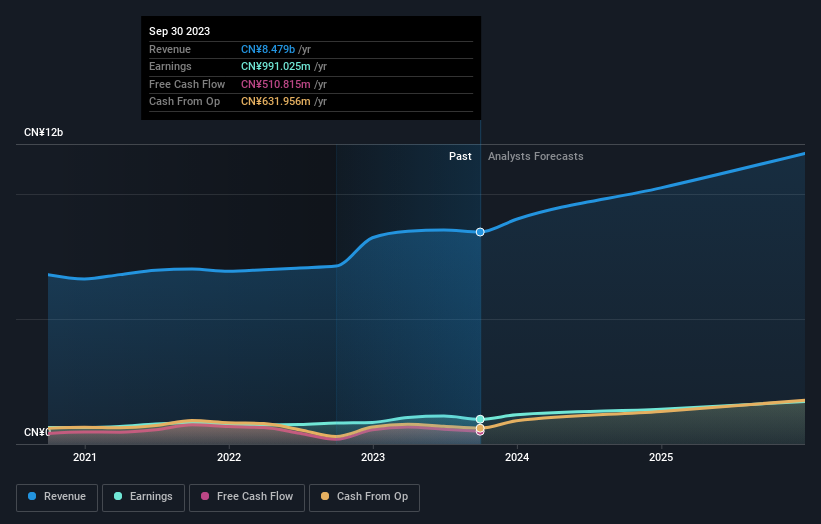Private companies own 43% of Tianjin Pharmaceutical Da Ren Tang Group Corporation Limited (SGX:T14) shares but retail investors control 46% of the company
Key Insights
The considerable ownership by retail investors in Tianjin Pharmaceutical Da Ren Tang Group indicates that they collectively have a greater say in management and business strategy
The top 14 shareholders own 50% of the company
Past performance of a company along with ownership data serve to give a strong idea about prospects for a business
Every investor in Tianjin Pharmaceutical Da Ren Tang Group Corporation Limited (SGX:T14) should be aware of the most powerful shareholder groups. We can see that retail investors own the lion's share in the company with 46% ownership. In other words, the group stands to gain the most (or lose the most) from their investment into the company.
Private companies, on the other hand, account for 43% of the company's stockholders.
Let's take a closer look to see what the different types of shareholders can tell us about Tianjin Pharmaceutical Da Ren Tang Group.
See our latest analysis for Tianjin Pharmaceutical Da Ren Tang Group
What Does The Institutional Ownership Tell Us About Tianjin Pharmaceutical Da Ren Tang Group?
Institutions typically measure themselves against a benchmark when reporting to their own investors, so they often become more enthusiastic about a stock once it's included in a major index. We would expect most companies to have some institutions on the register, especially if they are growing.
As you can see, institutional investors have a fair amount of stake in Tianjin Pharmaceutical Da Ren Tang Group. This implies the analysts working for those institutions have looked at the stock and they like it. But just like anyone else, they could be wrong. It is not uncommon to see a big share price drop if two large institutional investors try to sell out of a stock at the same time. So it is worth checking the past earnings trajectory of Tianjin Pharmaceutical Da Ren Tang Group, (below). Of course, keep in mind that there are other factors to consider, too.
We note that hedge funds don't have a meaningful investment in Tianjin Pharmaceutical Da Ren Tang Group. Looking at our data, we can see that the largest shareholder is Jinhushen Biomedical Technology Co., Ltd. with 43% of shares outstanding. With 1.0% and 0.9% of the shares outstanding respectively, National Council for Social Security Fund and GF Fund Management Co., Ltd. are the second and third largest shareholders.
A closer look at our ownership figures suggests that the top 14 shareholders have a combined ownership of 50% implying that no single shareholder has a majority.
While it makes sense to study institutional ownership data for a company, it also makes sense to study analyst sentiments to know which way the wind is blowing. There is a little analyst coverage of the stock, but not much. So there is room for it to gain more coverage.
Insider Ownership Of Tianjin Pharmaceutical Da Ren Tang Group
The definition of an insider can differ slightly between different countries, but members of the board of directors always count. Company management run the business, but the CEO will answer to the board, even if he or she is a member of it.
Insider ownership is positive when it signals leadership are thinking like the true owners of the company. However, high insider ownership can also give immense power to a small group within the company. This can be negative in some circumstances.
We can see that insiders own shares in Tianjin Pharmaceutical Da Ren Tang Group Corporation Limited. This is a big company, so it is good to see this level of alignment. Insiders own US$55m worth of shares (at current prices). Most would say this shows alignment of interests between shareholders and the board. Still, it might be worth checking if those insiders have been selling.
General Public Ownership
The general public-- including retail investors -- own 46% stake in the company, and hence can't easily be ignored. This size of ownership, while considerable, may not be enough to change company policy if the decision is not in sync with other large shareholders.
Private Company Ownership
Our data indicates that Private Companies hold 43%, of the company's shares. It might be worth looking deeper into this. If related parties, such as insiders, have an interest in one of these private companies, that should be disclosed in the annual report. Private companies may also have a strategic interest in the company.
Next Steps:
It's always worth thinking about the different groups who own shares in a company. But to understand Tianjin Pharmaceutical Da Ren Tang Group better, we need to consider many other factors. Take risks for example - Tianjin Pharmaceutical Da Ren Tang Group has 1 warning sign we think you should be aware of.
If you would prefer discover what analysts are predicting in terms of future growth, do not miss this free report on analyst forecasts.
NB: Figures in this article are calculated using data from the last twelve months, which refer to the 12-month period ending on the last date of the month the financial statement is dated. This may not be consistent with full year annual report figures.
Have feedback on this article? Concerned about the content? Get in touch with us directly. Alternatively, email editorial-team (at) simplywallst.com.
This article by Simply Wall St is general in nature. We provide commentary based on historical data and analyst forecasts only using an unbiased methodology and our articles are not intended to be financial advice. It does not constitute a recommendation to buy or sell any stock, and does not take account of your objectives, or your financial situation. We aim to bring you long-term focused analysis driven by fundamental data. Note that our analysis may not factor in the latest price-sensitive company announcements or qualitative material. Simply Wall St has no position in any stocks mentioned.


